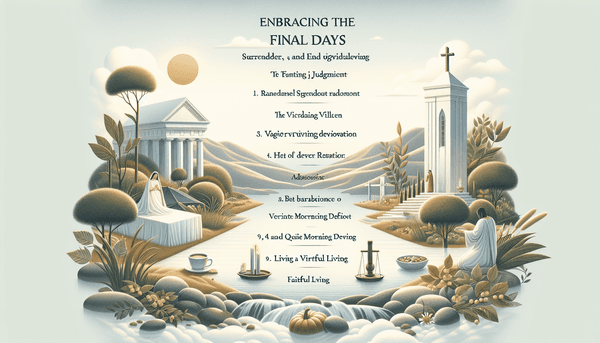The Judgment Day and End Times
The Bible speaks with sobering clarity about the day of judgment, signaling a time when all will stand before the throne of God to give an account. In the enigmatic visions of Revelation 20:12-13, the dead are judged according to their deeds, corroborating the solemn declaration in 2 Corinthians 5:10, where the apostle Paul reminds us that we must all appear before the judgment seat of Christ. Yet, despite these vivid portrayals, Jesus Himself, in Matthew 24:36, assures us that the precise moment of these events is shrouded in divine secrecy, known only to the Father. As such, the emphasis in Scripture is not on date-setting but on vigilant preparedness. Jesus' parable of the ten virgins in Matthew 25:13, and Peter's exhortation in 1 Peter 4:7 to be self-controlled and alert, both stir believers to live in a state of expectant readiness, ever watchful for the return of Christ.
Surrendering to God
Surrendering to God is an act of worship and devotion that transcends momentary emotions, becoming a lifelong pursuit. According to Romans 12:1-2, offering our bodies as a living sacrifice is our true and proper worship, an act that requires a transformation, a renewal of our minds to discern God's will. This act of surrender is echoed in the call to humility and dependence found in Psalm 51:17, where a contrite heart is prized by God. The daily commitment to follow God's lead is fortified by trusting in Him as Proverbs 3:5-6 advises, and by submitting to His authority and resisting the adversary as James 4:7-8 instructs. Galatians 2:20 poignantly encapsulates this surrender, as believers are called to live by faith in Christ, who loved us and gave Himself for us.
The Practice of Morning Prayer
The dawn ushers in new mercies and an opportunity for communion with the Divine. Morning prayer, as modeled in Psalm 5:3, allows the faithful to lay their requests before God and wait in expectation. Jesus Himself sought solitary communion with the Father at daybreak, as depicted in Mark 1:35, setting a precedent for His followers. This practice is not only about presenting our needs to God, as Philippians 4:6 encourages, but also about casting our anxieties on Him, trusting in His care as 1 Peter 5:7 assures. As we wait for the Lord's response, we do so with the hopeful anticipation described in Psalm 130:5-6, likened to watchmen awaiting the morning, knowing that those who wait on the Lord, as Isaiah 40:31 promises, will renew their strength.
Balancing Rest and Diligence
Scripture offers wisdom on maintaining a harmonious balance between rest and diligence. The book of Proverbs frequently addresses the pitfalls of laziness, with stark warnings such as those found in Proverbs 6:10-11 and Proverbs 20:13, which caution against overindulgence in rest. Yet, God also ordained times of rest, as exemplified by the Sabbath commandment in Exodus 20:8-11, and Jesus' invitation to His disciples in Mark 6:31 to come aside and rest. The Biblical ethos celebrates diligence in one's vocation; Colossians 3:23-24 urges believers to work heartily as for the Lord, contrasting the sluggard's field with the fruitful labor of the diligent in Proverbs 24:30-34.
Biblical Guidance on Healthy Living
The scripture addresses the stewardship of our physical bodies and the importance of moderation. Proverbs 25:16 warns against excess, while 1 Corinthians 6:19-20 reminds us that our bodies are temples of the Holy Spirit. This holistic approach to health is not merely about personal well-being but also encompasses a communal aspect. As we are called to share with those in need, exemplified in Matthew 25:35-36, we demonstrate the love of Christ in practical ways. The call to healthy living extends to the mind as well, where Philippians 4:8 instructs believers to dwell on whatever is true, noble, and praiseworthy, thus fostering a positive outlook that aligns with God's truth.
FAQ
Q: What does the Bible say about knowing the time of the end?
A: The Bible teaches that no one knows the exact time of the end times except for God. In Matthew 24:36, Jesus himself says, \"But about that day or hour no one knows, not even the angels in heaven, nor the Son, but only the Father.\" Believers are encouraged to be watchful and prepared at all times.
Q: What does it mean to give oneself to God?
A: Giving oneself to God involves acknowledging our need for Him, repenting of our sins, and trusting Jesus Christ as our Lord and Savior. It's a daily commitment to follow God's will, seek His guidance, and be transformed by the Holy Spirit, as indicated in Romans 12:1-2.
Q: What is the significance of the judgment day according to the Bible?
A: The judgment day is described in Revelation 20:12-13 as a time when everyone will be judged by God according to their deeds. It is a central event in Christian eschatology, emphasizing accountability and the finality of God's justice.
Q: What are the teachings on the practice of morning prayer?
A: Morning prayer is a time to commune with God, present our requests, and wait for His response. Verses like Psalm 5:3 and Mark 1:35 highlight the importance of seeking God early in the day and setting a tone of dependence and expectation for the day ahead.






